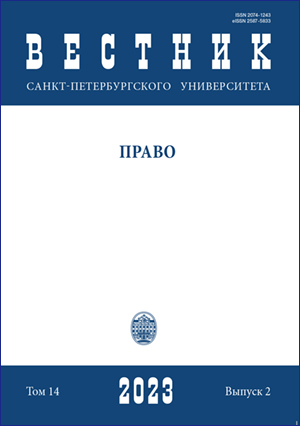Ограничительные условия в соглашениях между предпринимателями и их работниками по праву зарубежных стран. Часть первая: Великобритания и Соединенные Штаты Америки
DOI:
https://doi.org/10.21638/spbu14.2023.209Аннотация
Обзорная статья посвящена так называемым ограничительным условиям, широко распространенным в договорах между предпринимателями и их работниками во многих зарубежных государствах. В России указанные условия в основном не поддерживаются судами, так как считается, что эти ограничения противоречат конституционным и иным нормам отечественного права. Цель данного исследования — анализ основ правового регулирования в зарубежных странах таких ограничительных условий, как соглашения о неконкуренции, непривлечении, непредпринимательстве и неразглашении. Этот анализ необходим для обоснованного ответа на вопрос о целесообразности признания в России правомерности такого рода соглашений. В первой части дается обзор права об отказах от конкуренции и иных подобных ковенантах Великобритании и США, во второй части — Германии, Франции, Японии, Китая и государств — членов Евразийского экономического союза (ЕАЭС). В связи с особенно широким распространением таких ковенантов в США центральное место в исследовании занимает анализ основ их правового регулирования именно в этой стране. В юрисдикциях, в которых не запрещены соглашения о неконкуренции и другие подобные ограничительные условия, в качестве правого механизма уравновешивания конкурирующих интересов работодателей, работников и публичных интересов выступает правило разумного подхода, позволяющее судам в каждом конкретном споре оценивать указанные условия на предмет их соответствия защищаемым деловым интересам работодателя и другим критериям. Сделан вывод о целесообразности легализации в России соглашений о неконкуренции, непривлечении и непредпринимательстве с учетом положительного зарубежного опыта правового регулирования в этой сфере. В связи с этим необходимо будет закрепить в российском законодательстве аналог правила разумного подхода.
Ключевые слова:
ограничительное условие, соглашение о неконкуренции, соглашение о непривлечении, соглашение о непредпринимательстве, соглашение о неразглашении, свобода договора, свобода труда, коммерческие секреты, конфиденциальная информация
Скачивания
Библиографические ссылки
Загрузки
Опубликован
Как цитировать
Выпуск
Раздел
Лицензия
Статьи журнала «Вестник Санкт-Петербургского университета. Право» находятся в открытом доступе и распространяются в соответствии с условиями Лицензионного Договора с Санкт-Петербургским государственным университетом, который бесплатно предоставляет авторам неограниченное распространение и самостоятельное архивирование.






